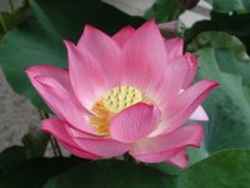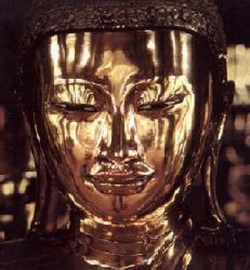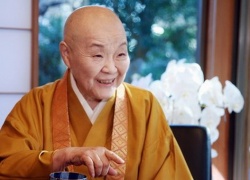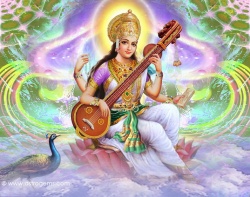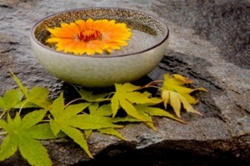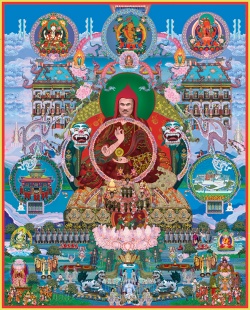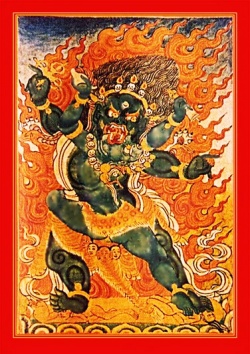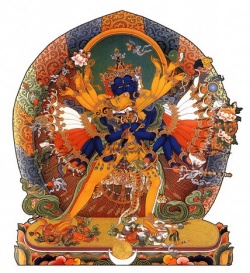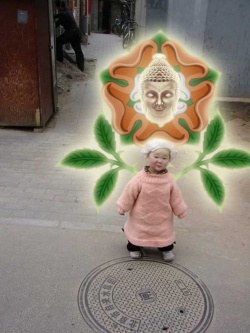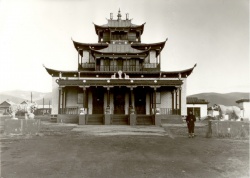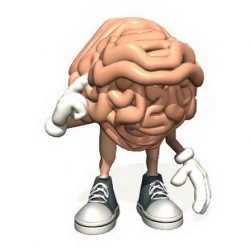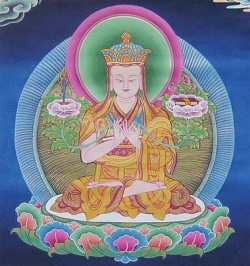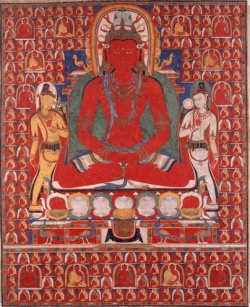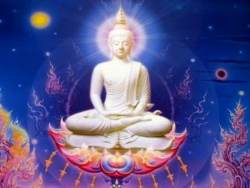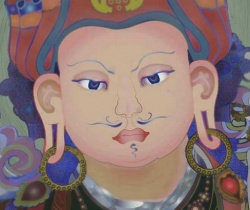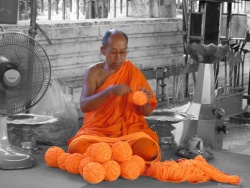The Ten Dharma Realms Are Not Beyond a Single Thought
Where do the Ten Dharma Realms come from?
They originate from the single thought presently in your mind.
If you wish to understand
All Buddhas of the three periods of time,
You should contemplate the nature of the Dharma Realm:
Everything is made from the mind alone.
If you wish to understand, if anyone wants to know all Buddhas of the three periods of time, the Buddhas of the three periods of time were all originally people who became Buddhas.
You should contemplate the nature of the Dharma Realm. Take a look at the nature of the Dharma Realm. Each living being in the Dharma Realm has its own nature. You have your nature, and I have my nature. For example, your temper is a bit bigger than mine, and my temper is a little deeper than yours. Would you say that they’re the same? Pigs have pig-natures, horses have horse-natures, men have a masculine nature, and women have a feminine nature. Each kind has its own nature. Those who like to eat sweet things have sweet natures. Those who like sour things have sour natures. Those who are fond of hot flavors have hot natures. And those who prefer to eat bitter things have bitter natures. Cultivation is also bitter in nature. Trees have the nature of trees, flowers have the nature of flowers, and grasses have the nature of grasses. Each kind has its own nature, so we call it the nature of the Dharma Realm. Do you understand now? In the past, you thought that this referred to the nature of the Dharma Realm, but now I’ve explained it as the "nature of the living beings" in the Dharma Realm.
The Avatamsaka Sutra says, "The myriad dharmas are made from the mind alone." The Buddha is created by your mind. If your mind cultivates the Buddhadharma, then you will accomplish the Buddha Way. If your mind is delighted by Bodhisattvas, then you will practice the Bodhisattva Path and become a Bodhisattva. And if your mind wishes to fall into the hells, then you’ll head in the direction of the hells, and eventually fall into them. That’s why it’s said, "The Ten Dharma Realms are not beyond a single thought."
(1) The Dharma Realm of Buddhas
Neither great nor small,
Neither come nor gone,
In worlds as many as motes of dust,
They shine upon each others’ lotus thrones.
Neither great nor small: When I first heard the Sanskrit word "Buddha," it sounded like bu da (Chinese for "not big.") What is not big? The Buddha. That means he has no arrogance, no pride, and no ego. He is not small either. If he weren’t big, but he was small, then he wouldn’t be the Buddha either. The Buddha is neither big nor small.
Neither come nor gone: The Buddha’s Dharma-body reaches to the ends of space and pervades throughout the Dharma Realm. It is nowhere present and yet nowhere absent.
If you say it goes, to where does it go? If you say it comes, to where does it come? The Buddha’s Dharma-body is universally pervasive; it is not only in this world, but in worlds as many as tiny specks of dust. Limitlessly and boundlessly many worlds are all the Buddha’s Dharma-body; that’s why it is said to be in worlds as many as motes of dust.
They shine upon each others’ lotus thrones. The light emitted by the Buddhas in this Dharma Realm shines on the Buddhas in other Dharma Realms; and the light of the Buddhas in those other Dharma Realm also shines on this Dharma Realm. The Buddhas are seated on lotus thrones, shining their lights upon one another and causing the earth to shake. Not only do their six sense organs emit light and shake the earth, their every hairpore emits light and shakes the earth. Furthermore, in each hairpore appear limitlessly and boundlessly many Buddhas in worlds as many as motes of dust. They all manifest in a single hairpore. And every one of the Buddhas emits infinite and boundless light. These lights do not obstruct one another. The lights mutually unite, and so we Buddhist disciples should also unite our light. There shouldn’t be clashes between people. This "shining" means your light shines on me, and my light shines on you. The lights shine on one another, similar to the way the holes are mutually connected in the circular net canopy of the Lord of the Great Brahma Heaven. The multiple layers of his imperial net are infinite and inexhaustible. The first Dharma Realm, the Dharma Realm of the Buddhas, is also that way.
(2) The Dharma Realm of Bodhisattvas
Sentient beings when enlightened
Leap out of the dust.
Their six perfections and ten thousand practices
At all times are nurtured.
Sentient beings when enlightened: Bodhisattva is a Sanskrit word which translates as "enlightened sentient being" or "enlightener of sentient beings." A Bodhisattva is one who teaches all sentient beings to become enlightened. That’s one explanation. Another explanation is that a Bodhisattva is an enlightened one among sentient beings. We have a share in both explanations; we can also become Bodhisattvas. Since we are living beings endowed with sentience, we can also become enlightened ones among living beings. Then we can use the enlightened principles to enlighten all other living beings. Similarly, a Buddha can be compared to a grownup, while we are like small children. Every day we must drink milk, and every day we must listen to the Dharma. Listening to the Dharma is especially helpful in making our good roots grow and bringing out our wisdom. Therefore, if you have the opportunity to listen to the Dharma, it will be worth more than any amount of money you could make. How fine it is if you can have the time to investigate the Buddhadharma!
I hope the people here will not travel too much. The reason I say this is because travelling is very dangerous. Have you noticed that there’s always more than one death during every vacation or holiday? So if you take a trip, you risk being among the casualties. Americans really enjoy having fun and taking vacations. We Buddhists should turn this trend around. It would be better to spend our vacations investigating the Buddhadharma, reciting sutras and mantras, and bowing to the Buddhas.
Among sentient beings, a Bodhisattva is an enlightened one. Among enlightened ones, he is one who understands. Among those who understand, he is one who cultivates. And among those who cultivate, he is one of true practice. If you don’t understand, then you won’t be able to leap out of the dust, because the dust is too thick. When you become enlightened, the dust has thinned out and you can leap out of it. What do you do after leaping out of the dust? Do you just sleep and eat? Well, you still have to sleep, eat, and dress, but those aren’t the only things you do. You don’t live for those three matters. Rather, you live in order to cultivate the six perfections and ten thousand practices. The six perfections are giving, holding precepts, patience, vigor, samadhi, and wisdom. Someone says, "I know what giving means. It means other people give me things." Wrong! You should give to others. You shouldn’t want money. Money is the filthiest thing, and if you stay in close proximity to it for too long, you will be defiled by it. If you don’t want money, then you are very pure and can leap out of the dust.
At all times are nurtured: It shouldn’t be that you cultivate today, but don’t cultivate tomorrow, or that you cultivate this year, but next year you don’t cultivate anymore. Or maybe you cultivate this month, but take a rest next month! Perhaps you cultivate in this life, but fail to cultivate in the next life. Or you cultivate in this moment, but by the next moment, you’ve fallen asleep. That’s not the way! In every moment and at all times, in life after life, we must cultivate the six perfections and ten thousand conducts. If you can do this, then you are a Bodhisattva.
Did you think it was easy to be a Bodhisattva? It’s not that easy! Not only is it not easy to be a Bodhisattva, it’s not easy to be One Enlightened to Conditions or a Hearer, either. What is it easy to be? It’s easiest to become a ghost, to fall into the hells, or to become an animal. "Difficult" is another way to say "not easy." A Bodhisattva must undertake bitter practices which other people find difficult to undertake, and endure what others find hard to endure. He doesn’t give up on doing those things which are not easy to do. One must always advance; one who is vigorous is a Bodhisattva. That’s all there is to it. There’s no other esoteric or wonderful method. If you can do the things that other people cannot do, then you are a Bodhisattva.
(3) The Dharma Realm of Those Enlightened to Conditions
The holy sages enlightened to conditions
Doze high on mountain peaks alone.
Springtime’s flowers wither in the fall
In a cycle of twelve interconnecting links.
The holy sages enlightened to conditions: Those who become enlightened when a Buddha is in the world are called Those Enlightened to Conditions. Those who become enlightened when there is no Buddha in the world are called Solitarily Enlightened Ones, because they get enlightened by themselves. They like to doze high on mountain peaks alone. Springtime’s flowers wither in the fall: They observe "the blooming of hundreds of flowers in the springtime, and the falling of yellow leaves in the autumn," and awaken to how the myriad things naturally come into being and then cease to be, in a cycle of twelve interconnecting links. They contemplate the twelve links of conditioned co-production:
1. Ignorance: They contemplate to see where ignorance comes from, and why it exists.
2. Activity: With ignorance, there is activity, and then there is manifestation. With manifestation, there is consciousness.
3. Consciousness: Consciousness refers to discrimination. Activity refers to conditioned dharmas. When conditioned dharmas arise, thoughts of discrimination arise. With thoughts of discrimination, the trouble comes.
4. Name and form: Name and form are the trouble. Name brings the trouble of name, and form brings the trouble of form. Name and form are the trouble, and the trouble is name and form. To talk about this matter is even more troublesome. Before I mentioned it, there was no trouble. But the mere mention of it brings trouble. Before I talked about this, you weren’t even aware of it, so you didn’t have that many troubles. Once I speak of it, since you don’t understand, you have the trouble of not understanding. Because you have this trouble of not understanding, you wish to understand. With the wish to understand, the six sense organs come into being.
5. Six sense organs: The six sense organs come about because you wish to understand things; that’s why the the eyes, ears, nose, tongue, body, and mind arise. Why do the six sense organs come into being? Because of the desire to understand. But who would have known that the more you try to understand, the more muddled you get. The more muddled you become, the less you understand. That’s the six sense organs.
6. Contact: Contact refers to touching or encountering. When we don’t understand, we go seeking encounters everywhere: east, west, north, south, above and below, just like a fly that keeps bumping into the wall. Why do we seek encounters? Because of our desire to understand.
7. Feeling: After we touch something, there is feeling. Before we run into difficulties, we feel very comfortable. Once we encounter difficulties, we feel very uncomfortable. When no one criticizes me, we feel very happy. But if anyone says something bad about us, we get upset. That’s feeling.
8. Love: When we have feelings, love and attachment arise. Why do people feel insecure? It’s because of love. Once there is love, there is also hatred, or detestation. We like and cling to favorable situations, but detest adverse states. Why do we feel happy? Why do we feel unhappy? It’s because we have feelings of love and hate. Hate refers to dislike and loathing. Because of these, our troubles increase day by day.
9. Grasping: When we see something we like, we want to grasp it. What is grasping? It is the action motivated by the wish to obtain something. Because you are fond of something, you wish to obtain it.
10. Becoming: Once you obtain it, you have satisfied your desire. Why do you want to fulfill your desire? It’s because you want to possess things. With that wish for possession, "becoming" occurs.
11. Birth: Because of becoming, you want to possess things. Once you want to possess things, there is birth into the next life.
12. Old age and death: With another birth, there is also old age and death again.
These twelve links of conditioned co-production are cultivated by Those Enlightened to Conditions.
(4) The Dharma Realm of Hearers
The Shravaka Sangha,
Both men and women,
Contemplate and practice the four holy truths,
Concealing the real and displaying the provisional.
The Dharma Realm of Hearers consists of Hearers of the First Fruition, Hearers of the Second Fruition, Hearers of the Third Fruition, and Hearers of the Fourth Fruition. These can further be divided into the threshold to the first fruition (those who haven’t actually realized the first fruition), the first fruition, the threshold to the second fruition, the second fruitition, the threshold to the third fruition, the third fruition, the threshold to the fourth fruition, and the fourth fruition. Those in the thresholds are turning away from the small and tending toward the great.
Hearers are also called Arhats. They can fly through the air and manifest transformations, and they are endowed with spiritual powers. People who have realized a certain fruition in their cultivation will not casually say, "I have certified to the fruition; I have attained Arhatship." They cannot do that. When those who have certified to the fruition of sagehood walk, their feet don’t touch the ground. They seem to be walking on the ground, but actually they are walking in air, and their shoes don’t touch the ground. Even when it’s very muddy, their shoes stay very clean. For example, even when the Venerable Fashun walked across very soft mud, his shoes didn’t get muddied at all. That’s a sign of one who has certified to sagehood.
Those of the first fruition have to sever the delusions of views. Those of the second fruition have to sever the delusions of thoughts. Those of the third fruition have to sever the delusions as many as dust and sand. As for ignorance, they have destroyed a bit of it, but they haven’t pierced through it completely. They haven’t exhaustively destroyed ignorance. Once they do, they will attain Buddha-hood. Even Bodhisattvas at the state of equal enlightenment still have a small amount of production-mark ignorance which keeps them from becoming Buddhas. What do the sages of the fourth fruition cultivate? They cultivate the Four Noble Truths of suffering, accumulation, cessation, and the Way.
In the beginning, Shakyamuni Buddha first went to convert the five Bhikshus in the Deer Park. These five Bhikshus were the Buddha’s relatives. They had been cultivating the Way with the Buddha, but some of them couldn’t endure the bitterness. When Shakyamuni Buddha was in the Himalayas, he ate one sesame seed and one grain of wheat each day, and he became as thin as a matchstick. Three of his relatives left because they were starving and couldn’t endure the suffering, and only two remained. Later, on the eighth day of the twelfth lunar month, a heavenly maiden made an offering of milk to the Buddha. When the Buddha drank the milk, his two remaining companions also left, saying, "Cultivation consists of ascetic practice. But now you have drunk milk. That shows that you can’t cultivate. You can’t take the suffering." Then they left. Those five people all went to the Deer Park.
After Shakyamuni Buddha was enlightened, he first spoke the Avatamsaka Sutra, but no people were able to hear it. Later, the Buddha bestowed the provisional for the sake of the real, and expounded the Agama Sutras. To whom did he speak? The Buddha contemplated: "Oh! I should first go and teach the five people who used to be my companions in cultivation."
In the past, Shakyamuni Buddha had made a vow, "If I become a Buddha, I will first save the people who have slandered me, killed me, and treated me the most badly." Who treated the Buddha the most badly? The Vajra Sutra mentions the King of Kalinga. When Shakyamuni Buddha was cultivating as the Patient Immortal in his former lives, the King of Kalinga dismembered that old cultivator’s body. Why did he do that?
Because Shakyamuni Buddha stayed up in the mountains cultivating the Way, his body became covered with a thick layer of dust. Yet he never came out of the mountains; he remained there working hard and cultivating ascetic practices. One day the King of Kalinga took his concubines along as he went hunting in the mountains. The concubines were were fond of playing, and instead of following the King as he hunted, they went to play in the mountains. After the King returned from hunting, he went looking for his concubines. He discovered them all standing together, talking with a very strange-looking person. They were touching his hands and feet, and it looked very improper. He was suddenly overwhelmed by a feeling of jealousy. The King listened to what the man was saying. He was talking about cultivating the Way. The King of Kalinga was enraged, "Don’t you be cheating my women! Just what kind of Way are you cultivating?" The old cultivator said, "I’m cultivating patience." "What do you mean by patience?" "Patience means that no matter who curses me or beats me, I don’t get angry." "You say you can be patient? Is that for real or not?" "Of course it’s for real." "All right, then let me test you out." The King of Kalinga drew his jeweled sword and hacked off the cultivator’s hand. Then he asked, "I’ve cut your hand off. Are you angry?" The old cultivator said, "No, I’m not angry."
"Fine! You’re not angry? Then you’ve really got some skill. But actually, you’re just lying. You’re angry inside, but you say you’re not. Are you trying to deceive me! I’m a very intelligent person. Do you really think you can fool me? All right, since you say you can be patient, and not get angry, I’ll cut off your other hand, too." The King cut the cultivator’s other hand off, and then asked, "Are you angry now?" The old cultivator said, "I’m still not angry." Then the King of Kalinga raised his jeweled sword and sliced off the cultivator’s two feet. Having cut off his four limbs, he asked, "Aren’t you angry?" The old cultivator said, "I’m still not angry. How can I prove it? If I’m angry at you, then my limbs will not grow back. If I am not angry, then my hands and feet will grow back, and I will be just as I was before. That will be proof that I have no anger." After the old cultivator (Shakyamuni Buddha in the stage of cultivation) spoke these words, his hands and feet actually did grow back as before.
When the gods, dragons, and the rest of the eight divisions of Dharma-protecting good spirits saw how the King of Kalinga had viciously cut off the old cultivator’s limbs, they manifested their spiritual might and sent down hailstones to pelt the King. Seeing how devastating the consequences were and witnessing the old cultivator’s spiritual transformations, the King knelt before the cultivator and begged to repent. The old cultivator then made a vow, "If I don’t become a Buddha, then there’s nothing to be said. But if one day I do attain Buddhahood, then I will first come and teach you to become a Buddha. If you don’t get enlightened and become a Buddha, then I won’t become a Buddha either. Therefore, after the Buddha attained Buddhahood, he went to the Deer Park to save Ajnatakaundinya first. The old cultivator was a former incarnation of Shakyamuni Buddha, and the King of Kalinga was a former incarnation of Ajnatakaundinya. Because the Buddha made that vow in his past life, he wanted to save the person who had treated him the worst.
Having heard this story, if we are treated badly by someone, we should make a vow to save him after we attain Buddhahood. Don’t think, "You’ve been so mean to me. When I become a Buddha, I’m going to make you fall into the hells." Don’t make that kind of vow.
When the Buddha arrived at the Deer Park, he turned the Dharma Wheel of the Four Holy Truths three times for the five Bhikshus.
The first turning:
This is suffering, it’s nature is oppression;
This is accumulation, it’s nature is enticement;
This is cessation, it’s nature is that it can be realized.
This is the Way, it’s nature is that it can be cultivated;
The second turning:
This is suffering, you should know it;
This is accumulation, you should cut it off;
This is cessation, you should realize it;
This is the Way, you should cultivate it.
The third turning:
This is suffering, I already know it and need not
know it again;
This is accumulation, I have already cut it off and
need not cut it off again;
This is cessation, I have already realized it, and
need not realize it any more;
This is the Way, I have already cultivated it and
need not cultivate it any more.
After speaking the Four Holy Truths, the Buddha said, "Ajnatakaundinya, you are troubled by the guest-dust and have not obtained liberation." When Ajnatakaundinya heard the words "guest-dust" he became enlightened. What is meant by "guest"? The guest is not the host. What is meant by "dust"? The dust is something impure. The self-nature is the host, and it is pure. So Ajnatakaundinya became enlightened, and his name means "one who understands the original limit," because he understood the basic principle.
The Shravaka Sangha, both men and women: Women can realize the fruition, and so can men. Once they realize the fruition, they are called Hearers, or Arhats. Dharma Master Kumarajiva’s mother, for instance, realized the third fruition of sagehood.
Contemplate and practice the four holy truths: Hearers contemplate and cultivate the four holy truths of suffering, accumulation, cessation, and the Way. They know suffering, cut off accumulation, yearn for cessation, and cultivate the Way, thus cultivating the Dharma-door of the Four Holy Truths.
Concealing the real and displaying the provisional: Some of the Hearers were actually great Bodhisattvas of the provisional teaching. They manifested as Hearers who practiced the provisional teaching; thus, they are said to be "concealing the real." They hid away their true merit and virtue. "Displaying the provisional" means instructing by means of clever and skillful expedients. Therefore, you shouldn’t take them to be Hearers, followers of the Small Vehicle; don’t look down on them. Not all of them are great Bodhisattvas, but some of them certainly are. Those Bodhisattvas of the Great Vehicle manifest as followers of the Small Vehicle in order to gather in those of the Small Vehicle, and then guide them to turn from the small toward the great. This is called "concealing the real and displaying the provisional."
(5) The Dharma Realm of Gods
The six desire and Brahma gods,
With five precepts and ten good acts,
Plant seeds that have outflows,
So the turning wheel is hard to stop.
The six desire and Brahma gods: The six Desire Heavens are the heavens of the Desire Realm. The Desire Realm, the Form Realm, and the Formless Realm are called the Three Realms. Right now, we are under the Heaven of the Four Kings, which is one of the six Desire Heavens. The heaven which we can see directly is the Heaven of the Four Kings, ruled by the Four Great Heavenly Kings. This Heaven is located halfway up Mount Sumeru.
The people of ancient China recognized the supreme lord, but did not know about the Buddha. In the Shang Dynasty, Emperor Tang used a black bull as an offering to the supreme lord and said, "I, Lu, but a small child, presume to use this black bull in venturing to make known to the Supreme Ruling Lord that if I have offenses, they are not the people’s, and if the people have offenses, the offenses rest with me." Emperor Tang’s name was Lu, and he referred to himself as a small child out of respect for the supreme lord. He earnestly told the Lord that if he made errors, the citizens should not be blamed, and that if the common folk of his country committed offenses, the responsibility should rest with the Emperor for not having taught them correctly.
The ancient sages and worthies would always blame and punish themselves, unlike people nowadays who, clearly knowing they are at fault, say, "Oh, I didn’t have anything to do with it. It’s all his doing." "It’s his fault, so why are you blaming me?" "God, you’re really unfair! Why is that person so rich, while I’m penniless? Why is he so honored, while I’m lowly?" They damn heaven and curse at people, never admitting that they are wrong, and only looking for the faults of others. The ancient sages always acknowledged their own mistakes.
The second heaven is the heaven of Lord Shakra. There are eight heavens to its east, eight heavens to its west, eight heavens to its south, and eight heavens to its north, making thirty-two heavens surrounding it. That’s the second heaven in the Desire Realm.
The third heaven is the Suyama Heaven. The beings in this heaven are extremely happy, and they sing songs from morning to night. What do they sing? They sing, "How happy I am!" They are happy in the six periods of the day and night. Suyama means "time period," because every time period is joyful.
The fourth is the Tushita Heaven. Tushita means "blissfully content." The gods are constantly happy and satisfied. Since they know to be content, they are always happy. From morning to night, they have no cares or worries, and no afflictions. This heaven is also called the Heaven of Contentment, because the gods are constantly content and happy, with no worries or afflictions.
The fifth is the Heaven of Bliss by Transformation. The gods can obtain happiness by transformation. When they think about clothing, clothing appears. When they think about food, food appears. Freely performing transformations, they are extremely blissful.
The sixth is the Heaven of Transformation of Others’ Bliss. Originally these gods had no happiness of their own, so they take the bliss of other heavens and transform it into their own. Why do they do this? It’s because they’re unprincipled. They’re just like bandits in the human realm who seize the wealth and possessions of other people for themselves, not caring whether others live or die. Many celestial demons and their retinues can be found in this heaven.
"The six desire and Brahma gods": The six Desire Heavens have already been discussed. The Brahma heavens refer to the Great Brahma Heaven, the Heaven of the Multitudes of Brahma, and the Heaven of the Ministers of Brahma. They cultivated the five precepts and ten good acts, thus earning the blessings of being born in the heavens. But these are good roots which have outflows. They plant seeds that have outflows, / So the turning wheel is hard to stop. Since they plant these seeds that have outflows, it is difficult for them to end birth and death. One must cultivate the causes for transcending the world if one wants to escape the turning wheel of samsara.
(6) The Dharma Realm of Asuras
Asuras have a violent nature;
Laden with blessings, lacking power,
Absolutely determined to fight,
They bob along in karma’s tow.
Asura is a Sanskrit word which means "unattractive" or "ugly." Male asuras are extremely ugly and love to fight with others. Female asuras are extremely beautiful, but they love to wage mental wars using jealousy, obstructiveness, ignorance and afflictions.
Although the asuras are an individual Dharma Realm by themselves, no matter which destiny it is, if there are aggressive fighters with huge tempers who like to order others around but don’t like be ordered around, who like to supervise others but don’t like to be supervised, these are also manifestations of asuras.
Among people, asuras can be good or bad. The good asuras include military officials and soldiers, and the bad asuras are bandits, thieves, and so forth. In general, those who like to steal other people’s things, seize others’ belongings, beat people, or kill people, are all called asuras.
In the heavens, the asuras wage war with the heavenly troops. From morning to night, they hope to overthrow Lord Shakra and seize the jeweled throne. But they are defeated every time, because although they possess the blessings of gods, they lack the power of gods. Therefore, they may wage war with the heavenly troops, but they are always defeated.
The asuras in the animal realm tend to take advantage of the other animals. Wolves, tigers, and lions, for example, wish to eat other animals, because they have asura natures. Snakes and eagles are also asuras.
Asuras in the ghost realm bully other ghosts. There are good ghosts and evil ghosts. The evil ghosts refuse to listen to reason. Basically, ghosts generally cannot be reasoned with, but the evil ghosts are the most unreasonable among the unreasonable.
Asuras have a violent nature: they are extremely violent in nature. Laden with blessings, lacking power: they have heavenly blessings, but no power in the heavens. They struggle for power and gain, but fail to get them. Absolutely determined to fight: they just love to fight. Take a look at this world: it’s a world of asuras. All that people talk about is fighting, fighting, fighting. People are fighting for this and fighting for that. You knock me over, and I push you down. They bob along in karma’s tow: they are dragged by the force of their karma into the karmic destinies. Therefore, cultivators must avoid fighting at all costs. Don’t be so belligerent and eager to fight. Don’t have an explosive temper, and then you won’t be associated with asuras.
In general, asuras refuse to listen to reason. They constantly lose their temper at everyone. If we take a closer look at the asuras, we find that five of the nine Dharma Realms contain asuras. In the Dharma Realm of animals, there are asuras among the birds and asuras among the beasts. For example, crocodiles are asuras in the aquatic world. There are also horse asuras. In a herd of horses, there may be one horse which causes a lot of trouble. That’s known as "a horse which harms the herd." Most bulls are also asuras. The bovine nature is an asura nature. Dogs are even more prone to be asuras. People who raise dogs and spend a lot of time with dogs may also develop asura natures, so be careful! Don’t run off to join the asuras.
(7) The Dharma Realm of People
The way of people is harmony,
With merit and offenses interspersed.
On virtuous deeds you rise, offenses make you fall;
It has nothing to do with anyone else at all.
There are good people and bad people. Human beings are harmonious by nature and can get along with anyone, so the verse says, The way of people is harmony. / With merit and offenses interspersed. People are neither completely good nor completely bad. If they were completely good, they would ascend to the heavens. If they were completely bad, they would become animals or hungry ghosts, or fall into the hells. They have a bit of merit, but they also have a bit of offenses. Either their merit exceeds their offenses, or their offenses exceed their merit. When a person’s merit is greater than his offenses, he will be born in a rich and distinguished family, but with little merit and many offenses he will be born into a poor family. Between these two extremes are myriad differences and distinctions, based on the amount of good and bad karma each individual has created. People are neither totally yin nor totally yang. Those who are totally yin may become ghosts, while those who are predominantly yang will ascend to the heavens, instead of remaining as people. On virtuous deeds you rise, offenses make you fall. If you perform deeds of merit and virtue, you will ascend. If you commit heavy sins, you will descend. It has nothing to do with anyone else at all. Other people cannot make you fall into the hells, become a hungry ghost, or turn into an animal. That happens only because of the offenses you yourself committed. As it’s said, "You commit the offenses yourself, and you also undergo the retribution yourself." That’s the human realm.
(8) The Dharma Realm of Animals
Eager animals feed on greed,
Never sated by a lot.
Because they make what’s black white,
They don’t distinguish wrong from right.
The seven Dharma Realms discussed above are relatively good ones, and you can try them out. You can enter them as if taking part in a play. But you shouldn’t try out the three Dharma Realms which will be discussed now. If you try them out, you might not be able to get out again. It is said, "Once you lose your human body, you may not regain it for ten thousand eons," so this is very dangerous.
Now, the realm of animals does not merely consist of only one kind of animal. There are billions of different species of animals. If you consider just the flying animals, there are already hundreds of thousands of myriads of varieties. Animals that walk and crawl are also quite numerous. They may be as small as mice, or as large as elephants. Deer, bears, horses, and cows are also large animals. These are all land animals, of which there are also hundreds of thousands of myriads of species. Aquatic creatures, such as seals, water buffaloes, and sea horses, are also infinite in variety. Even physicists, chemists, biologists, zoologists, or other specialists or Ph.D.s cannot completely understand all the different kinds of animal species in the world.
Where do animals come from? They come from greed. Eager animals feed on greed. No matter what it is, they want a whole lot of it, the more the better; a little won’t do. Because they are never sated by a lot, they can’t tell that something is black. They’ll say that it’s white. Because they make what’s black white, they take what is not good to be good. This shows that they have no power of reasoning. So they’re greedy for great quantities of everything. They’re even greedy for something as filthy as dog excrement. The more they eat, the more aromatic and savory they find it. They don’t distinguish wrong from right. They don’t know what’s right and what’s wrong. They can’t distinguish between right and wrong, because they’re not clear about it. They don’t have the ability to reason. Because of their greed, they become confused. They are covered by ignorance and know nothing at all.
If we are very greedy, we are in danger of turning into animals. Let me tell you, if left-home people fail to cultivate according to the precepts established by the Buddha, they will fall even faster. The ancients had a saying, "Many of those standing at the gates of the hells are Buddhist monks and Taoist priests." They are all waiting at the gates of the hells. Those greedy Taoist cultivators and greedy monks thought that the hells would be a fun place to go, but after they get there, they find out that it’s not fun at all.
(9) The Dharma Realm of Hungry Ghosts
The ghostly crew delights in hate,
Deluded by effects, confused about cause.
Their ignorance and upside-downness
Grow greater each day, deeper each month.
Most people have heard of ghosts. Some people believe in ghosts, but others say that ghosts don’t exist. There are even some Buddhists who don’t believe in ghosts. Just exactly what are ghosts? Ghosts are masses of yin energy which have shadow and no form, or form and no shadow. Sometimes you may see a dark shadow, but when you look closer it disappears. Perhaps you see what appears to be a person, but it vanishes in the twinkling of an eye. It’s not easy to understand the principles behind such phenomena.
How many varieties of ghosts are there? There are as many kinds of ghosts as the sands in the Ganges’ River. If you want to know how many kinds of ghosts there are, you have to cultivate the Way. When you cultivate to the point that you open the five eyes and attain the six spiritual powers, then you’ll know how many kinds of ghosts there are.
As to the people who say that there are no ghosts, I tell them that if there are no ghosts, then there are also no Buddhas, no people, and no animals. This is because animals, people, and asuras are also transformations of ghosts. The gods, Arhats, Those Enlightened By Conditions, Bodhisattvas, and Buddhas all come from the destiny of ghosts. Why is this? It’s because the Ten Dharma Realms are not apart from a single thought. This one thought creates the Ten Dharma Realms. By acting like a ghost, you fall into the realm of ghosts; by behaving like a person you can become a person. If you do the deeds of Arhats, then you join the ranks of Arhats. If you do the work of Bodhisattvas, then you become part of the retinue of Bodhisattvas. If you perform the deeds of Buddhas, then you’ll become a Buddha. If you do hellish things, then you’ll fall into the hells. So this is all created from the present thought of your mind.
The ghostly crew delights in hate: Ghosts like to vent their tempers and get angry. If they are treated well, they get mad. If they are treated badly, they also get mad. What do they like to do best? They like to give people trouble. If you are good to them, they give you trouble. If you aren’t good to them, they also give you trouble. There’s a saying, "Lighting a stick of incense calls forth the ghosts." They come to bother you and make you get sick. So Confucius said, "One should respect the ghosts and spirits, but stay far away from them." You should certainly respect the ghosts and spirits, but don’t get near them. It’s better to keep them at a distance.
Deluded by effects, confused about cause. Since they aren’t clear about the effects, and they don’t understand the causes, they can’t tell the difference between good and bad. Basically, if you plant good causes, you will receive good effects. If you plant bad causes, you will receive bad effects. If you plant melons you will get melons; if you plant beans you will get beans. Since they don’t understand cause and effect, they plant eggplant in the hope of harvesting hot peppers, or plant hot peppers and anticipate eating cucumbers. They do things in total confusion; that’s what is meant by being deluded by effects and confused about cause. Their ignorance and upside-downness / Grow greater each day, deeper each month. The karma they create day after day keeps adding up. The more karma they create, the deeper their offenses become, and the deeper their offenses are, the more karma they want to create, so they end up falling into the ghost realm.
(10) The Dharma Realm of the Hells
The hells’ anxiety and suffering
Is devoid of doors, yet one bores right in.
Giving rise to delusion, deeds are done.
The retribution is borne in due accord.
The hells are the most miserable place. If any of you would like to take a tour there, there’s a way which I guarantee will get you there instantly. What way? It is said,
Depressed and melancholy, you roam through the hells;
Happy and smiling, you enjoy eternal youth;
Weeping and woe make a small dark room in the hells.
If you becomes depressed, you are planting a seed for the hells. In contrast, if you smile, you plant a seed for the heavens. "From ancient times, the divine immortals have had no other practice than merely being happy and not being sad." So if you can always smile, then even when you’re old, you’ll still be youthful. If you cry, you give yourself a lot of vexation. To sum it up, The hells’ anxiety and suffering are such that there is no happiness in the hells. They are melancholy and miserable. Is devoid of doors, yet one bores right in: The hells basically have no doors. You make the doors yourself, and burrow your way in by force, determined to get in at all costs. Giving rise to delusion, deeds are done. / The retribution is borne in due accord: Why do people end up in the hells? Because of ignorance and lack of understanding, they create evil karma. No matter what kind of karma you create, you have to undergo the corresponding retribution. The operation of cause and effect is never the slightest bit off. This cycle has no end to it.
Conclusion:
All of these ten realms—a single thought—
Are not apart from your present thought.
If you can understand that thought,
You immediately reach the other shore.
The Buddhas, Bodhisattvas, Hearers, and Those Enlightened by Conditions are the Four Dharma Realms of Sages. The gods, people, asuras, hells, hungry ghosts and animals make up the Six Dharma Realms of Ordinary Beings. Together, they make the Ten Dharma Realms. Where do the Ten Dharma Realms come from? They originate from the single thought presently in your mind. All of these ten realms—a single thought / Are not apart from your present thought. The Ten Dharma Realms are not beyond your present thought. If you can understand that thought: If you understand this present thought, then you immediately reach the other shore. You attain Mahaprajnaparamita. Reaching the other shore means you become enlightened and are no longer deluded. You smash through ignorance. When ignorance is shattered, the Dharma-body appears.
